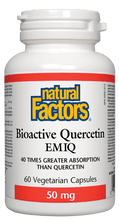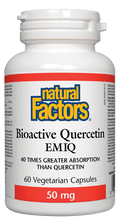Uses and benefits
• Helps control allergy symptoms
• May support healthy blood pressure and heart health
• Provides antioxidant protection
• Bioactive quercetin is a water-soluble nutrient with greater bioavailability
• Provides 50 mg of highly absorbable quercetin and 50 mg of vitamin C per capsule
Advanced allergy control
Enzymatically modified isoquercitrin (EMIQ) is a highly bioavailable form of quercetin – a flavonoid that exerts significant anti-allergy effects. The limiting factor in quercetin’s clinical efficacy appears to be its poor bioavailability, so EMIQ by Natural Factors offers consumers a more efficacious product.
Feature summary
Enzymatically modified isoquercitrin (EMIQ) is a highly bioavailable form of quercetin – a flavonoid that exerts significant anti-allergy effects. EMIQ is manufactured through natural enzymatic process that attaches glucose chains (glycosides) to the quercetin molecule. The result of this modification is that the quercetin is provided in a water-soluble form thereby greatly enhancing its bioavailability. In the digestive process the glycoside portion is cleaved, liberating the quercetin, and as a result EMIQ greatly increases quercetin levels in the blood compared to the ingestion of quercetin or its related compound rutin. Blood levels of quercetin are more than 40 times greater with EMIQ compared to an equal amount of quercetin. EMIQ has been found to be safe in many toxicity studies and has been self-affirmed as Generally Recognized as Safe (GRAS) for use in specific foods in the US and as an antioxidant. Natural Factors Bioactive Quercetin EMIQ contains no GMOs, artificial colours, preservatives or sweeteners, fish, shellfish or animal products, and is suitable for vegetarians/vegans.
How it works
EMIQ can be viewed as a precursor molecule to quercetin – a flavonoid that has demonstrated a wide range of beneficial effects in preclinical studies, especially in regards to anti-allergy properties. Unfortunately, until now quercetin has not shown much clinical effect because of poor absorption. By increasing the quercetin content in the blood and throughout the body, EMIQ produces significant benefits particularly as it relates to antioxidant protection and anti-allergy effects. In addition to its antioxidant effects, EMIQ exerts anti-allergenic properties by reducing the formation of allergic mediators such as histamine as well as stabilizing membranes of mast cells to block the release of histamine and other allergic/inflammatory compounds. As a result of this action on mast cells, EMIQ helps control allergy symptoms. EMIQ may also offer benefits in protecting against cardiovascular disease via a number of mechanisms. In addition to antioxidant properties, EMIQ increases the formation of nitric oxide (NO) by the cells that line the blood vessels. NO formation is associated with improved blood flow and blood pressure control. The primary applications of EMIQ at present are in promoting health in individuals suffering from allergies, but it may also show benefit in people experiencing increased oxidative stress such as those with high blood pressure.
Research In preclinical trials, quercetin has demonstrated many potent effects including anti-allergenic, anti-carcinogenic, and cardioprotective actions. Unfortunately, quercetin has shown very poor oral absorption in humans. In contrast, EMIQ possesses high bioavailability in both humans and animals. It effectively raises quercetin levels in the blood thereby allowing for quercetin to exert its beneficial effects. The absorption of EMIQ was confirmed by Murota et al. (2010). They demonstrated that EMIQ exerts ideal properties in the intestinal fluid by means of its improved solubility and bioavailablilty. The number of people with allergic diseases has been significantly on the rise, particularly in developing countries. There are a number of possible explanations for this occurrence, but a lot of the blame is directed to increased oxidative stress. By increasing antioxidant protection, as well as exerting anti-allergenic properties on mast cells, EMIQ offers significant benefits for allergy sufferers. There is clinical evidence to support this claim. In a study conducted by Kawai et al. (2009), the efficacy of EMIQ was investigated for the relief of symptoms of pollen allergies. In this double-blind placebo controlled study, 20 subjects suffering from Japanese cedar pollinosis took 2 capsules daily of 100 mg EMIQ or a placebo for 8 weeks during the pollen season. Throughout the course of the study, the total ocular score and ocular itching score for the EMIQ group were significantly lower (p<0.05) than for the placebo group, confirming its effectiveness against allergic symptoms. Another study in similar patients with pollinosis showed equally beneficial effects in reducing ocular symptoms (Hirano et al., 2009). Hypertension, which is closely related to the life-threatening diseases arteriosclerosis and cardiovascular disease, is becoming a great health concern worldwide. Recently, oxidative stress due to reactive oxygen species has been reported to be linked to the development of hypertension. Emura et al. (2007) investigated the anti-hypertensive effect of orally administered EMIQ in spontaneously hypertensive rats. Their results indicated that EMIQ administration significantly suppressed the increase of systolic blood pressure (SBP) in comparison to the control group, even at lower dosages, and this SBP suppression was more effective than that of quercetin. In addition to the ability of EMIQ to potentially lower blood pressure by increasing NO production, a study conducted by Motoyama et al. (2009) found that the compound potently suppressed the progression of atherosclerosis (hardening of the arteries). Specifically, they found that EMIQ decreased the numbers of macrophages and increased collagen content in arterial plaque, suggesting it also possesses a plaque-stabilizing effect, which is important for heart attack prevention. It is also well-known that flavonoids have demonstrated a number of anti-cancer properties. Studies with EMIQ are consistent with those of other flavonoids in noting these effects. For example, Shimada et al. (2010) demonstrated that the administration of EMIQ reduced the formation of cancers in the organs of male and female rats by altering the redox balance to prevent oxidative stress and reducing the tumour-promoting activity of inflammatory responses.
References
Emura, K., et al. (2007). Effect of enzymatically modified isoquercitrin in spontaneously hypertensive rats. Journal of Nutritional Science and Vitaminology, 53:68-74.
Hirano, T., Kawai, M., Arimitsu, J, et al. (2009). Preventative effect of a flavonoid, enzymatically modified isoquercitrin on ocular symptoms of Japanese cedar pollinosis. Allergol Int, 58(3):373-82.
Kawai, M., et al. (2009). Effect of enzymatically modified isoquercitrin, a flavonoid, on symptoms of Japanese Cedar pollinosis: a randomized double-blind placebo-controlled trial. Allergy and Immunology, 149:359-368.
Motoyama, K., et al. (2009). Atheroprotective and plaque-stabilizing effects of enzymatically modified isoquercitrin in atherogenic apoE-deficient mice. Nutrition, 25:421-427.
Murota, K., et al. (2010). α-Oligoglucosylation of a sugar moiety enhances the bioavailability of quercetin glucosides in humans. Archives of Biochemistry and Biophysics, 501:91-97.
Shimada, Y., et al. (2010). Antioxidant enzymatically modified isoquercitrin suppresses the development of liver preneoplastic lesions in rats induced by β-naphthoflavone. Toxicology, 28:213-218.




